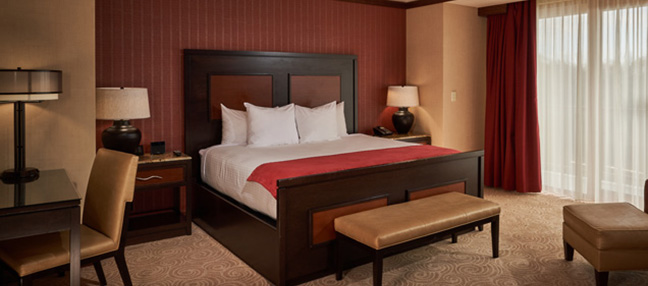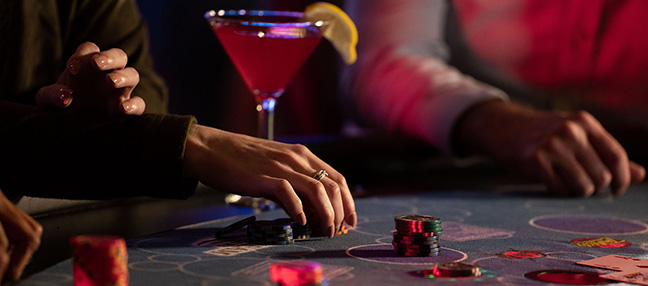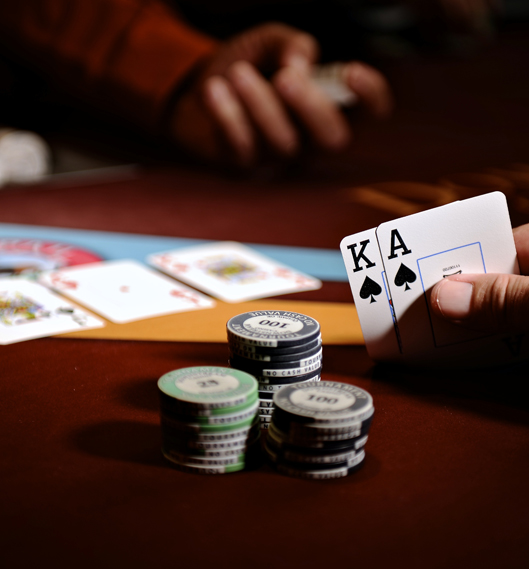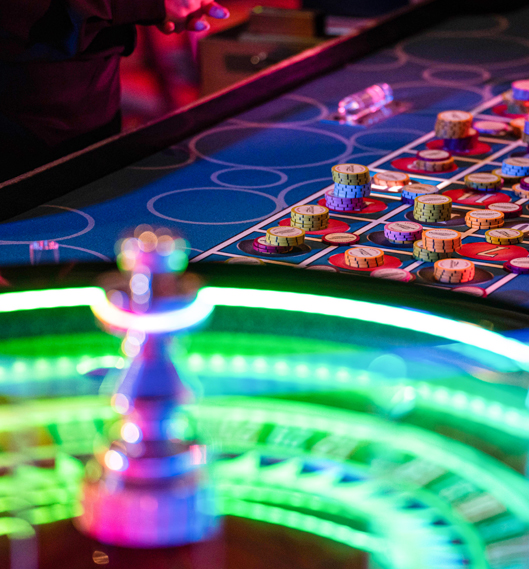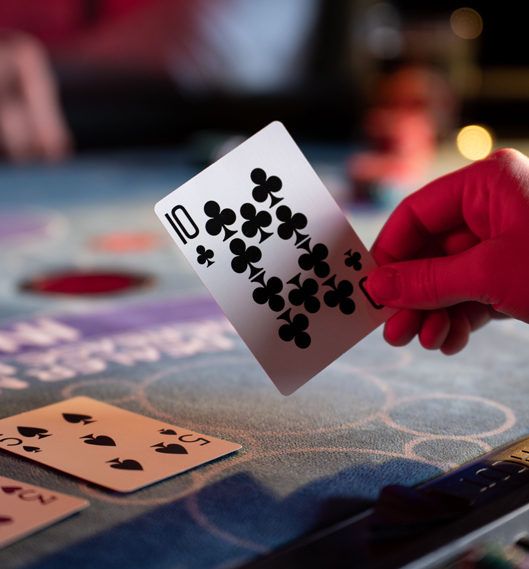Bet on a Better Night’s Sleep
Go all in on relaxation with luxurious room & suite options.
Play for Perks
Unlock VIP upgrades, exclusive event invites & member-only discounts.
Get in the Game
Score more than you bargained for with weekly player offers and giveaways.
Make the Night One to Remember
Catch outdoor concerts and top-tier performances during your stay.
Raise the Stakes on Taste
Feed your appetite with five unique dining experiences to choose from.
Plan a Winning Event
No matter the occasion, our venues make unforgettable gatherings a sure bet.
SIGN UP FOR SPECIAL OFFERS
Join the Downstream Casino Resort A-List for secret codes, special events and big announcements
Table Games
The excitement of the gaming floor comes alive with thrilling table games at Downstream Casino & Resort. Dive into the action with Ultimate Texas Hold’em, a dynamic poker variation that keeps the stakes high and the strategy sharp. Test your luck and skill with Crazy 4, where players build powerful hands and go head-to-head with the dealer for big rewards. For those who love the classic feel of blackjack with an exhilarating twist, Trilux and Bet the Set offers a unique spin on the traditional game, with multiple ways to win.
Poker Games
Step into the action and put your skills to the test at the poker tables. Poker games blend strategy, psychology, and chance, challenging players to outplay the competition hand after hand. From Texas Hold’em to other popular variations, each game delivers high-energy excitement and opportunities to win big—learn how to play below.
Ultimate Texas Hold‘Em
Ultimate Texas Hold’em® features heads-up play against the dealer and the optional Trips side bet. This game gives you several advantages:
-
The earlier you bet, the more you can bet.
-
You don’t have to fold until you see all the community cards.
-
The Trips bonus pays odds if your final five-card hand is a three-of-a-kind or better.
Getting Started
Make equal bets in the ante and blind circles. You may also make the Trips bonus bets. You will then receive two cards.
Bet Big...or Small...or Not At All
When you get your two hole cards, you can either check or bet 3x-4x your ante. The dealer then reveals the three-card flop. If you haven’t already made a play bet, you have a choice: check or bet 2x your ante. The dealer then reveals the final two community cards. If you haven’t already made a play bet, you have a choice: fold or bet 1x your ante.
Winning & Losing
The dealer then reveals their two hole cards and announces the hand. If your hand beats the dealer’s your play and ante bets win even money. If the dealer’s hand beats yours, your play, ante and blind wagers lose. If you tie, those bets push. The blind pays if your winning hand is at least a straight (see layout for odds). If you beat the dealer with less than a straight, it pushes.
Dealer Qualifying
The dealer needs a pair to qualify. When the dealer doesn’t qualify, your ante will push and be returned. All other bets placed will receive action.
Three Card Poker
Three Card Poker ® is an exciting stud poker game that allows you to bet against the dealer, bet on the value of your own three-card hand, or bet both. Bonus payouts may be had for certain hands when wagering against the dealer. Three Card Poker also offers the optional Pair Plus ® bonus wager.
Ante
The Ante wager lets you play against the dealer’s hand. If you bet on the Ante and like your hand, you must place an equal wager on the Play.
Play
It’s your three-card poker hand against the dealer’s three-card poker hand, and the best hand wins!
Note: You must make the Play wager or you will forfeit your Ante wager.
Pair Plus
The Pair Plus wins if your three-card poker hand contains a pair or better.
Ante Bonus
If you make the Ante and Play wagers, you are eligible to win an Ante Bonus payout even if the dealer doesn’t qualify, and even if the dealer’s hand beats your hand.
Mississippi Stud
Mississippi Stud® is a five-card poker game that lets you bet up to 10 units on a single hand. In Mississippi Stud, you compete against a paytable, not against the dealer, and you win if your poker hand contains a pair of jacks or better.
Getting Started
Make an Ante bet. Once all wagers have been placed, the dealer will give each participating player their two hole cards and place three community cards face down in the middle of the layout.
Play or Fold?
At this point, you may either fold or make the 3rd Street bet of 1x to 3x your ante. The dealer then reveals the first community card. Once you see the first community card, you have a choice: fold or make the 4th Street bet of 1x to 3x your ante. The dealer then reveals the second community card. Once again, you can fold or stay in the game by making the 5th Street bet of 1x to 3x your ante.
Note: When you fold, you forfeit your ante and any additional main game bets placed.
Winning and Losing
After the dealer turns over the final community card, all remaining wagers are resolved. You win if your five-card poker hand contains a pair of jacks or better (pairs of 6s-10s push).
Crazy 4 Poker
Crazy 4 Poker ® is an easy game to master. It offers play against the dealer and an optional Queens Up side bet.
How to Play Crazy 4 Poker
You receive five cards to make your best four-card poker hand. A four-card straight is a straight, a four-card flush is a flush, etc.
Player Vs. Dealer
Make equal bets on the ante and Super Bonus spots. After seeing your cards, you can fold or stay in the game by making the play wager. The play wager must match your ante unless you have a pair of aces or better. If you have at least a pair of aces, you may bet up to three times your ante. The dealer qualifies with a king-high or better. When you beat the dealer’s qualifying hand, your ante and play bets win even money. When the dealer qualifies and beats your hand, your ante and play bets lose. When the dealer does not qualify your play bet wins and your ante bet pushes. Super Bonus and Queens Up wagers are resolved normally.
Super Bonus
The Super Bonus wins if you have a straight or better. Failure to get at least a straight does not result in an automatic loss. Your Super Bonus bet pushes if you tie or beat the dealer with less than a straight. If the dealer beats you and your hand doesn’t contain a straight or better your ante, play and Super Bonus bets lose. However, If the dealer beats you and your hand does contain a straight or better your Super Bonus bet is paid and your original Super Bonus wager is NOT removed.
Queens Up
The Queens Up bonus bet wins when you receive a pair of queens or better.
Note: Winning Queens Up wagers are paid regardless of the dealer’s hand.
Multi-Game Link Progressives
How it Works
All progressive pays are based on five-card poker hands. This wager is offered on all carnival games. The odds of winning the top prize with a Royal Flush are the same across all games. After the player places the mandatory main game wager, the player may then place the optional Multi Game Link Progressive wager.
- MISSISSIPPI STUD is played exactly the same, with the five-card hand used to determine progressive winning pays.
- CRAZY 4 POKER still play as usual for the base game, using the best four-card hand from the five cards dealt. All five player's cards are combined to determine the progressive wager outcome.
- ULTIMATE TEXAS HOLD’EM, the base game play does not change. The five cards used to determine a progressive winner are the player’s two-hole cards plus the first three community cards (the flop).
- THREE CARD POKER will use the player’s three cards combined with two community cards to make a five-card poker hand to determine a progressive winner.
Roulette
Place your bets, and test your luck at the roulette table at Downstream Casino Resort! Playing roulette offers many ways to win—learn how to play below.
Roulette is a classic casino game where players place bets on where a spinning ball will land on a numbered wheel, offering a blend of strategy and chance. With options for inside and outside bets, it's a thrilling experience for both novice and seasoned players.
Getting Started
Start your roulette game by placing your chips on the numbered table layout to make your bets. You have the option to make "inside bets," "outside bets," or a combination of both, depending on your roulette strategies.
How to Play Roulette
All players must purchase chips from the dealer before they can start play. The dealer will give each player a specific chip color so each player's wagers are separate from each other. The chip value depends on what the player purchases. When the patron is ready to leave the Roulette Table, they must first redeem their chips for cashable chips.
Place wagers by placing colored chips on the roulette table. The object of the game is to correctly guess where the ball will land on a roulette wheel. As wagers are being placed, the dealer spins the roulette wheel in one direction. As the wheel spins, the dealer drops the ball so that it travels in the opposite direction. Wagers may be placed until the dealer announces, "No more bets." When the ball finally rests on a segment in the roulette wheel, the dealer calls out the winning number and places a marker on it. The dealer will then clear the losing wagers and pay out the winning wagers.
Inside bets are made on specific numbers or small groups of numbers located on the inside of the table layout. These bets typically offer higher payouts but come with a lower chance of winning. Outside bets are placed on the outer edges of the table and cover larger groups of numbers, such as betting on all red or all black numbers, odd or even numbers, or a specific range of numbers. These bets have a higher probability of winning, but the payouts are smaller.
You can continue to place your chips until the dealer announces, "No more bets," signaling that the betting phase is over. After this, watch as the dealer spins the wheel and the ball bounces around until it lands on a single number. The winning number is revealed and you'll see if your bets have paid off.
Players should not remove winning wagers or place new bets until all winners have been paid. After the roulette table is cleared, the dealer announces, "Place your bets," signaling the beginning of a new game.
Roulette is a game driven entirely by luck, with no skill or strategy involved. Whether you win three times or thirty, your odds remain consistent with each spin. The only elements within your control are how much you wager, how long you stay in the game and how frequently you play.
Blackjack
Experience the timeless allure of one of the most popular table games, Blackjack. Where basic strategy meets suspense in the quest for 21, offering an exhilarating blend of skill and chance at Downstream Casino Resort. With side bets and multiple versions of the classic casino card game available, including Trilux and Bet the Set, which will you choose?
How to Play Blackjack
The objective of blackjack is to have the total point value of the cards dealt to the player exceed the total point value of the dealer's hand without going over 21. Each player's wager is a bet against the dealer's hand.
The dealer starts the game by dealing two cards face-up to each player. The dealer takes one card face up and leaves the second as a face-down card placed underneath the first. Each card assumes the value of the card shown, with kings, queens, and jacks counting as 10. The ace counts either as 1 or 11, whichever the player chooses. After all hands have been dealt, the dealer asks how each player wishes to act. The player must indicate the decision to hit or stand with hand signals—"hit" (tapping on the table) gesturing for an additional card and "stand" (waving in a slicing motion) gesturing for no additional cards.
In addition to standing or hitting, you also have the option to double down, split pairs or take insurance.
Doubling Down
You can double down on any two cards, except a hand totaling 21, by placing an additional wager equal to your original bet. You'll receive only one more card to complete your hand.
Splitting Pairs
If your first two cards are a pair, you can split them into two separate hands by placing an equal bet next to your original one. If you receive another pair, you can split again, up to three times, creating a total of four hands. When splitting Aces, however, you'll only get one additional card per Ace, and a 10-value card on a split Ace counts as 21 but not a Blackjack.
After all players have acted on their hands, the dealer turns over the second card in the dealer's hand. The dealer must take an additional card on any point total of soft 17 or less and stand on any point on hard 17 or more. If a dealer's point total exceeds 21, all players who have a point total of 21 or less automatically win and beat the dealer. If a dealer's point total is 21 or less, the dealer pays all the players hands that exceed the dealer's point total and collects all bets on hands that are less than the dealer's point total.
If any of the players and dealers point totals are the same, the player's bet "pushes" and is returned to the player.
Double Deck Blackjack
This blackjack game offers a twist with just two decks, enhancing your odds and adding excitement to the game. Enjoy strategic play as you aim for 21 and outsmart the dealer in this popular casino favorite.
Getting Started
Double Deck Blackjack is played with two decks of cards, and the goal is to get a hand as close to 21 as possible without exceeding it. If your hand total is closer to 21 than the dealer's, you win. Cards numbered 2 through 10 are worth their face value, while Jacks, Queens and Kings are worth 10. Aces can be valued at either 1 or 11, depending on which is more favorable to your hand. A "Blackjack" occurs when your first two cards are an Ace and a 10-value card, which pays out at 3 to 2.
How to Play Double Deck Blackjack
Once all players have placed their bets, the dealer deals two cards to each player and themselves. The dealer will reveal one card face up, while keeping the other face down.
Instead of using hand signals, players swipe their cards to hit or tuck their cards to stand, creating a more hands-on experience. After each new card, players decide whether to swipe for additional cards or tuck their cards to stand.
The dealer will stand on a hard 17, and players are allowed to double down on any two cards, including on a Blackjack. If your hand total is higher than the dealer's, or if the dealer goes over 21, you win even money. If your total is the same as the dealer's, it's a "push," meaning you neither win nor lose.
In addition to standing or hitting, you also have the option to double down, split pairs or take insurance.
Doubling Down
You can double down on any two cards, except a hand totaling 21, by placing an additional wager equal to your original bet. You'll receive only one more card to complete your hand.
Splitting Pairs
If your first two cards are a pair, you can split them into two separate hands by placing an equal bet next to your original one. If you receive another pair, you can split again, up to three times, creating a total of four hands. When splitting Aces, however, you'll only get one additional card per Ace, and a 10-value card on a split Ace counts as 21 but not a Blackjack. In Double Deck Blackjack, Aces can only be split once.
Trilux
Game Basics
TriLux Bonus is an optional bonus bet for blackjack that considers your first two cards and the dealer’s up-card.
How to Play Trilux
1. To begin each round, make a standard blackjack wager. You may also make the TriLux Bonus wager.
2. The dealer then follows house procedures for blackjack.
3. Once you have your two cards, and the dealer has their upcard, the dealer will settle the TriLux Bonus wagers.
Bet The Set
Game Basics
Bet the Set “21”® is an optional wager for blackjack that considers the first two cards you receive. The value of your hand is independent of the dealer’s hand and is unaffected by the dealer’s blackjack.
How to Play Bet the Set
1. To begin each round, make your standard blackjack wager, you may also make the Bet the Set 21 wager.2. The dealer then follows house procedures for blackjack.
Winning and Losing
Once each player has received two cards, the dealer settles all Bet the Set 21 wagers. If your hand contains a pair, you win. If your first two cards are not a pair, your Bet the Set 21 wager will lose.
Note: All bonus payouts apply to the player’s first two cards only.
Blazing 777 Blackjack Progressive
How to Play Blazing 777 Blackjack Progressive
Blazing 777 Blackjack Progressive is an exciting new optional blackjack progressive bet that wins based on how many 7’s the player receives in their hand. The more 7’s in your hand, the more you win!
Getting Started
To begin each round, make a standard blackjack bet and the Blazing 7’s progressive bet. The dealer then follows the house procedures for blackjack.
How to Win
You win if at least one of your first two cards are a 7. You win more if both of your first two cards are 7’s. The payouts increase further if your first two cards are 7’s and the dealer has a 7 up.
Craps
Feel the excitement—and the rush—that comes with throwing the dice at Downstream Casino. Craps games are widely considered one of the best games to play at a casino. Take your chances by placing wagers on the outcome of each roll and step up to the craps table.
How to Play Craps
The player rolling the dice is called the shooter, who will select two dice out of a selection of five. On the shooter's very first roll (the come-out roll) there is a marker on the end table with the word “OFF.” Players who made a pass line bet—a wager made before the first roll of the dice—win on 7 or 11 and lose on 2, 3 or 12. Any other dice total: 4, 5, 6, 8, 9 or 10, becomes the shooter's "point" or point number.
When the “point” is established the marker is placed on the number rolled and flipped over to show the word “ON”. All players need the "point" to repeat again to win on the pass line - before the shooter rolls a 7. The shooter continues to roll the dice until they make the "point" or a 7. The dice pass to the next player when the point loses and a 7 rolls.
Regardless of who the shooter is, all craps bets on the table are in action with the shooter.
Dice-Ology
Dice-Ology™ is a bonus wager for craps that allows you to make three separate optional wagers.
Getting Started
You may make one, two or all three of following Dice-Ology bonus wagers.
- Little Ones: The “Little Ones” bonus wager pays, if, the dice rolls all of the “little” numbers (2,3,4,5,6) before any 7 is rolled.
- Big Ones: The “Big Ones” bonus wager pays, if, the dice rolls all of the “big” numbers (8,9,10,11,12) before any 7 is rolled.
- Boom or Bust: The “Boom or Bust” bonus wager pays, if, the dice rolls all of the numbers (2,3,4,5,6,8,9,10,11,12) before any 7 is rolled.
